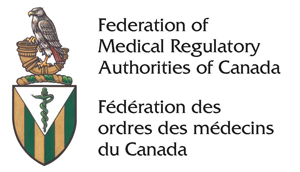View the following document in PDF format.
Introduction
The purpose of this document is to describe the principles and processes for a standard approach for reporting to the medical regulatory authorities (MRAs) on non-compliance and/or non-adherence by a licensed physician with the continuing professional development program (CPD) requirements of one the two national certifying colleges: the College of Family Physicians of Canada (CFPC) and the Royal College of Physicians and Surgeons of Canada (Royal College). While FMRAC aims for nationally consistent policies and processes, it is important to note that each MRA’s participation is voluntary and adaptable to its own needs.
With the implementation of physician revalidation programs in the majority of Canadian jurisdictions, participation by all licensed physicians in one of the two national systems of CPD has been accepted as one way of providing satisfactory evidence of their commitment to continued competence in their practice.
The link between CPD and licensure requires, in most jurisdictions, the CFPC and Royal College to report to the applicable MRA on non-compliance and non-adherence by licensed physicians in either of their two programs – Maintenance of Proficiency (MAINPRO®) and Maintenance of Certification (MOC), respectively.
With the implementation of physician revalidation programs in the majority of Canadian jurisdictions, participation by all licensed physicians in one of the two national systems of CPD has been accepted as providing satisfactory evidence of their commitment to continued competence in their practice.
The link between CPD and licensure requires, in most jurisdictions, the CFPC and Royal College to report to the applicable MRA on non-compliance and non-adherence by licensed physicians in either of their two programs – Maintenance of Proficiency (MAINPRO®) and Maintenance of Certification (MOC), respectively.
Non-compliance is defined as failure to complete and document the required credits by the end of a 5- year cycle or any approved extensions (for example, maternity leave, other leave from practice or an extension for remedial purposes). Non-compliance triggers a removal from membership/fellowship from the national certifying college.
Non-adherence is defined as failing to meet an annual threshold. Non-adherence triggers educational support from the national certifying colleges to assist the participant in obtaining and documenting the required credits. The CFPC and the Royal College will report non-adherence annually and after the first year when educational support strategies have not produced the desired response. In the case of nonadherence, a collaborative approach to the physician will be undertaken by the certifying college and the MRA.
Principles and Processes for Reporting
A sample of a standard reporting process between the national certifying colleges and the MRAs has been developed and is based on the following principles and processes for reporting.
The reporting processes must be:
1. Based on each provincial and territorial MRA developing a consent process, for example, as part of initial registration or the annual process for renewal of licensure, from physicians with licenses to practice in each provincial or territorial jurisdiction.
Rationale: This will enable the two national certifying colleges to report on participation in the MAINPRO® or MOC Program without concern regarding breach of privacy.
2. Based on a standard national reporting template that is adaptable when required across all provincial and territorial MRAs.
Rationale: Consistency and uniformity of reporting are important, especially when dealing with physicians who are relocating from one province/territory to another; however, it is recognized that adaptability is necessary to allow the MRAs to define a different set of requirements when needed to meet established regulations. As such, the national certifying colleges are amenable to providing additional information if requested by an MRA.
3. Annual, based on participation from the previous year.
Rationale: Given that both the MAINPRO® and MOC Program have (or will) establish program regulations that are based on both annual and five-year cycle credit requirements, reporting on adherence within an individual’s cycle is an important expectation. Because participants can, conceivably, report credits up until the last day of a calendar year, the most valid reporting period for the purposes of MRAs’ validation of compliance will be the previous full year.
4. Organized to occur at a specified time in the year when reporting on the previous year’s CPD activities can be deemed to be ‘complete’.
Rationale: Reporting deadlines for the MOC Program are January 31 for the previous year and June 30 for Mainpro. There are extensions to this reporting deadline that are important for individuals who are nearing the end of their cycle. Therefore, the establishment of a time during the year when the reporting provides a ‘complete’ reflection of the previous year is appropriate.
5. Based on achieving the annual credit requirement during the previous year and achieving the five-year cycle requirements, where applicable.
Rationale: Adherence to program requirements is based on a minimal number of credits that must be completed on an annual basis; compliance with the program is based on completion of the five year cycle. Reporting on participants who are non-adherent and non-compliant is a reasonable expectation.
6. Linked with multiple support processes and approaches currently provided by each national certifying college in collaboration with MRAs.
Rationale: There are well established and effective support processes and approaches that have been
developed by the national certifying colleges to assist their participants in meeting the annual
and cycle-specific expectations. These processes are formative and enabling. The MRAs agree in
principle to collaborate with the certifying colleges, particularly as regards physician non-adherence.
This position statement was developed by FMRAC’s Accreditation and Education Advisory Committee, with contributions from its observer representatives from the College of Family Physicians of Canada and the Royal College of Physicians and Surgeons of Canada.
